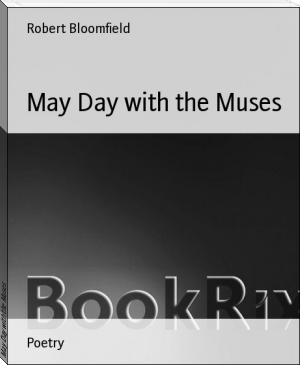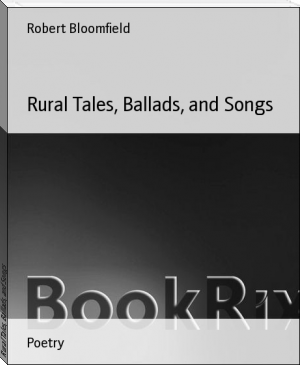Wild Flowers by Robert Bloomfield (rocket ebook reader .txt) 📖

- Author: Robert Bloomfield
Book online «Wild Flowers by Robert Bloomfield (rocket ebook reader .txt) 📖». Author Robert Bloomfield
PREFACE
A man of the first eminence, in whose day (fortunately perhaps for me) I was not destined to appear before the public, or to abide the Herculean crab-tree of his criticism, Dr. Johnson, has said, in his preface to Shakspeare, that--"Nothing can please many, and please long, but just representations of general nature." My representations of nature, whatever may be said of their _justness_, are not _general_, unless we admit, what I suspect to be the case, that nature in a village is very much like nature every where else. It will be observed that all my pictures are from humble life, and most of my heroines servant maids. Such I would have them: being fully persuaded that, in no other way would my endeavours, either to please or to instruct, have an equal chance of success.
The path I have thus taken, from necessity, as well as from choice, is well understood and approved by hundreds, who are capable of ranging in the higher walks of literature.--But with due deference to their superior claim, I confess, that no recompense has been half so grateful or half so agreeable to me as female approbation. To be readily and generally understood, to have my simple Tales almost instinctively relished by those who have so decided an influence over the lives, hearts, and manners of us all, is the utmost stretch of my ambition.
I here venture, before the public eye, a selection from the various pieces which have been the source of much pleasure, and the solace of my leisure hours during the last four years, and since the publication of the "Rural Tales." Perhaps, in some of them, more of mirth is intermingled than many who know me would expect, or than the severe will be inclined to approve. But surely what I can say, or can be expected to say, on subjects of country life, would gain little by the seriousness of a preacher, or by exhibiting fallacious representations of what has long been termed _Rural Innocence_.
The Poem of "Good Tidings" is partially known to the world, but, as it was originally intended to assume its present appearance and size, I have gladly availed myself of an endeavour to improve it; and, from its present extended circulation, I trust it will be new to thousands.
I anticipate some approbation from such readers as have been pleased with the "Rural Tales;" yet, though I will not falsify my own feelings by assuming a diffidence which I do not conceive to be either manly or becoming, the conviction that some reputation is hazarded in "a third attempt," is impressed deeply on my mind.
With such sentiments, and with a lively sense of the high honour, and a hope of the bright recompence, of applause from the good, when heightened by the self-approving voice of my own conscience, I commit the book to its fate.
ROBERT BLOOMFIELD.
DEDICATION.
TO MY ONLY SON.
MY DEAR BOY,
In thus addressing myself to you, and in expressing my regard for your person, my anxiety for your health, and my devotion to your welfare, I enjoy an advantage over those dedicators who indulge in adulation;--I shall at least be believed.
Should you arrive at that period when reason shall be mature, and affection or curiosity induce you to look back on your father's poetical progress through life, you may conclude that he had many to boast as friends, whose names, in a dedication, would have honoured both him and his children; but you must also reflect, that to particularize such friends was a point of peculiar delicacy. The earliest patron of my unprotected strains has the warm thanks which are his due, for the introduction of blessings which have been diffused through our whole family, and nothing will ever change this sentiment. But amidst a general feeling of gratitude, which those who know me will never dispute, I feel for you, Charles, what none but parents can conceive; and on your account, my dear boy, there can be no harm in telling the world that I hope these "Wild Flowers" will be productive of sweets of the worldly kind; for your unfortunate lameness (should it never be removed) may preclude you from the means of procuring comforts and advantages which might otherwise have fallen to your share.
What a lasting, what an unspeakable satisfaction would it be to know that the Ballads, the Plowman Stories, and the "Broken Crutch" of your father would eventually contribute to lighten your steps to manhood, and make your own crutch, through life, rather a memorial of affection than an object of sorrow.
With a parent's feelings, and a parent's cares and hopes,
I am, Charles, yours,
R. B.
CONTENTS
Abner and the Widow Jones, a Familiar Ballad
To My Old Oak Table
The Horkey, a Provincial Ballad
The Broken Crutch, a Tale
Shooter's Hill
A Visit to Ranelagh
Love of the Country
The Woodland Hallo
Barnham Water
Mary's Evening Sigh
Good Tidings; or, News from the Farm
ABNER AND THE WIDOW JONES,
A Familiar Ballad.
Well! I'm determin'd; that's enough:--
Gee, Bayard! move your poor old bones,
I'll take to-morrow, smooth or rough,
To go and court the Widow Jones.
Our master talks of stable-room,
And younger horses on his grounds;
'Tis easy to foresee thy doom,
Bayard, thou'lt go to feed the hounds.
The first Determination.
But could I win the widow's hand,
I'd make a truce 'twixt death and thee;
For thou upon the best of land
Should'st feed, and live, and die with me.
And must the pole-axe lay thee low?
And will they pick thy poor old bones?
No--hang me if it shall be so,--
If I can win the Widow Jones.
Twirl went his stick; his curly pate
A bran-new hat uplifted bore;
And Abner, as he leapt the gate,
Had never look'd so gay before.
Old Love revived.
And every spark of love reviv'd
That had perplex'd him long ago,
When busy folks and fools contriv'd
To make his Mary answer--_no_.
But whether, freed from recent vows,
_Her_ heart had back to Abner flown,
And mark'd him for a second spouse,
In truth is not exactly known.
Howbeit, as he came in sight,
She turn'd her from the garden stile,
And downward look'd with pure delight,
With half a sigh and half a smile.
Rustic Salutation.
She heard his sounding step behind,
The blush of joy crept up her cheek,
As cheerly floated on the wind,
"Hoi! Mary Jones--what wont you speak?"
Then, with a look that ne'er deceives,
She turn'd, but found her courage fled;
And scolding sparrows from the eaves
Peep'd forth upon the stranger's head.
Down Abner sat, with glowing heart,
Resolv'd, whatever might betide,
To speak his mind, no other art
He ever knew, or ever tried.
A clear Question.
And gently twitching Mary's hand,
The bench had ample room for two,
His first word made her understand
The plowman's errand was to woo.
"My Mary--may I call thee so?
For many a happy day we've seen,
And if not mine, aye, years ago,
Whose was the fault? you might have been!
"All that's gone by: but I've been musing,
And vow'd, and hope to keep it true,
That she shall be my own heart's choosing
Whom I call wife.--Hey, what say you?
Past Thoughts stated.
"And as I drove my plough along,
And felt the strength that's in my arm,
Ten years, thought I, amidst my song,
I've been head-man at Harewood farm.
"And now, my own dear Mary's free,
Whom I have lov'd this many a day,
Who knows but she may think on _me?_
I'll go hear what she has to say.
"Perhaps that little stock of land
She holds, but knows not how to till,
Will suffer in the widow's hand,
And make poor Mary poorer still
The Avowal.
"That scrap of land, with one like her,
How we might live! and be so blest!
And who should Mary Jones prefer?
Why, surely, him who loves her best!
"Therefore I'm come to-night, sweet wench,
I would not idly thus intrude,"--
Mary look'd downward on the bench,
O'erpower'd by love and gratitude.
And lean'd her head against the vine,
With quick'ning sobs of silent bliss,
Till Abner cried, "You must be mine,
You must,"--and seal'd it with a kiss.
The Interest of an old Horse asserted.
She talk'd of shame, and wip'd her check,
But what had shame with them to do,
Who nothing meant but truth to speak,
And downright honour to pursue?
His eloquence improv'd apace,
As manly pity fill'd his mind;
"You know poor Bayard; here's the case,--
He's past his labour, old, and blind:
"If you and I should but agree
To settle here for good and all,
Could you give all your heart to me,
And grudge that poor old rogue a stall?
His Character.
"I'll buy him, for the dogs shall never
Set tooth upon a friend so true;
He'll not live long, but I for ever
Shall know I gave the beast his due.
"'Mongst all I've known of plows and carts,
And ever since I learn'd to drive,
He was not match'd in all these parts;
There was not such a horse alive!
"Ready, as birds to meet the morn,
Were all his efforts at the plough;
Then, the mill-brook with hay or corn,
Good creature! how he'd spatter through!
Character continued.
"He was a horse of mighty pow'r,
Compact in frame, and strong of limb;
Went with a chirp from hour to hour;
Whip-cord! 'twas never made for him.
"I left him in the shafts behind,
His fellows all unhook'd and gone,
He neigh'd, and deem'd the thing unkind.
Then, starting, drew the load alone!
"But I might talk till pitch-dark night,
And then have something left to say;
But, Mary, am I wrong or right,
Or, do I throw my words away?
Something like Consent.
"Leave me, or take me and my horse;
I've told thee truth, and all I know:
Truth _should_ breed truth; that comes of course;
If I sow wheat, why wheat will grow."
"Yes, Abner, but thus soon to yield,
Neighbours would fleer, and look behind 'em;
Though, with a husband in the field,
Perhaps, indeed, I should not mind 'em.
"I've known your generous nature well,
My first denial cost me dear;
How this may end we cannot tell,
But, as for Bayard, bring him here."
Parting of the Lovers.--Sad News.
"Bless thee for that," the plowman cried,
At once both starting
 The unity of form and content is what distinguishes poetry from other areas of creativity. However, this is precisely what titanic work implies.
The unity of form and content is what distinguishes poetry from other areas of creativity. However, this is precisely what titanic work implies. 




Comments (0)